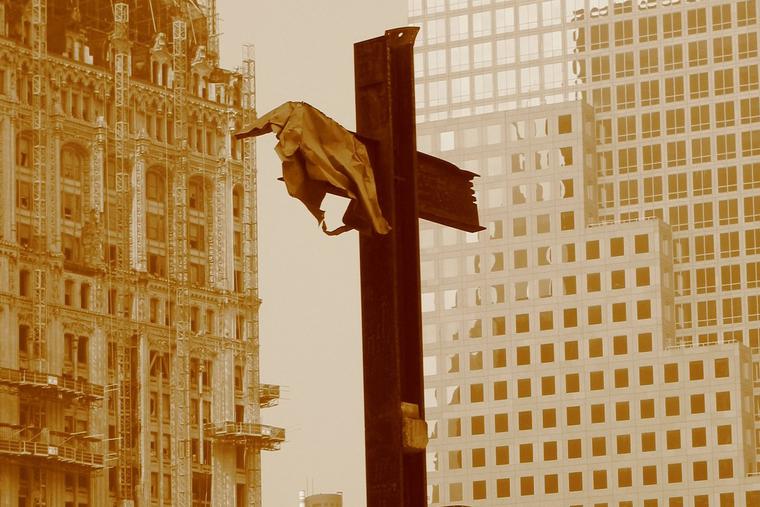Embracing Our Spiritual Truths: Editorial for 9/11’s 10th Anniversary
Let us pray that the inconvenient truths revealed through this searing tragedy will not be forgotten. In fear and trepidation, we clung to the Lord. Let us now abide with him in love.

Editor’s Note: This editorial ran in print in 2011 to commemorate the 10th anniversary of 9/11.
On Fifth Avenue in Midtown Manhattan, the soaring Gothic spires of St. Patrick’s Cathedral face a 15-foot-tall, 7-ton cast bronze statue of Atlas, who stands at the main entrance to Rockefeller Plaza.
The colossal sculpture was installed in 1937, decades after the cathedral was consecrated in 1879.
According to Greek mythology, Atlas was a Titan — one of the half-god, half-man giants who rose up against the gods of Olympus and thus was punished for his presumption with the task of carrying the weight of the world on his shoulders.
As our nation commemorates the 10th anniversary of the terrorist attacks of Sept. 11, 2001, we ponder the lessons learned from many vantage points, whether we’re thinking about national security and foreign-policy issues or the pattern of our own spiritual life. But the juxtaposition between a towering complex of skyscrapers guarded by Atlas and a cathedral that contains a suffering man on a cross and a tabernacle protecting his sacred Body surely testifies to our conflicted human nature.
Many people are sorely tempted to supplant the Creator, yet we also shrink from the evil that lurks in men’s hearts and look for signs of hope.
In the wake of the terrorist attacks, that second impulse led many in the city to seek respite in churches, as Cardinal Edward Egan, the retired archbishop of New York, notes in an interview. The fear that pervaded the city — and indeed much of the nation — was not limited to personal or collective concerns about future terrorist threats.
It went much deeper. We sought spiritual shelter from the brutal, systematic destruction unleashed before us.
A day after the terrorist attacks, Pope John Paul II offered up his prayers for the dead and articulated the deep fears the attacks stirred in the world: “How is it possible to commit acts of such savage cruelty? The human heart has depths from which schemes of unheard-of ferocity sometimes emerge, capable of destroying in a moment the normal daily life of a people. But faith comes to our aid at these times when words seem to fail. Christ’s word is the only one that can give a response to the questions which trouble our spirit.
“Even if the forces of darkness appear to prevail, those who believe in God know that evil and death do not have the final say. Christian hope is based on this truth; at this time our prayerful trust draws strength from it.”
His response offered soothing reassurance, but the Holy Father surely sought to elicit a strong spiritual response from his audience. His reflection embraced truths people often ignore when times are good.
As Catholics, we know our relationship with the Creator provides the foundation for our own identity and our capacity to love and serve others.
But, in practice, how do we actually respond to God’s invitation to know and love him in this world? And to what degree do we allow that central relationship to be shaped by the prevailing culture and its idolatry of individual autonomy and material treasure?
As we take note of Atlas’ defiant stance from across Fifth Avenue, we may find his smug complacency disturbingly familiar.
Christ — the only Son of the Father and the image of the invisible God — marks our true path to earthly fulfillment. As “sons of the Son,” our relationship with the Father precedes and lays the groundwork for our role as stewards of creation and servants of our fellow men.
Like the Son, we turn to the Father with prayers of praise and thanksgiving, of intercession and petition.
Christian realism prepares us for a humble acceptance of the human condition: Though god-like, by necessity, we must guard against the moral blindness that leads to the misuse of our powers.
That wisdom once informed our culture, but today when evil is committed in the name of religion, many condemn religion for transgressing man’s laws.
The truth is: God’s commandments draw boundaries that uphold human dignity.
“The worship of the one God sets man free from turning in on himself, from the slavery of sin and the idolatry of the world,” states the Catechism of the Catholic Church.
The Word did not enter the world of the ancient Greeks. But when Christ entered human history, taking the form of a vulnerable infant, in that moment, he revealed to us that we are sons in the Son most perfectly in our acknowledgment of our weakness and need for the Father.
It is in and through our human vulnerability that God pours out the power of his love and secures our hope.
Cardinal Egan confirms this point when he observes that 9/11 “woke us up. … It was evil, but the people reacted with renewed commitment to the Lord.” Now he fears that the profound spiritual impact of the attacks may be “receding.” Let us pray that the inconvenient truths revealed through this searing tragedy will not be forgotten.
In fear and trepidation, we clung to the Lord. Let us now abide with him in love.
- Keywords:
- 9/11
- September 11
- never forget

















